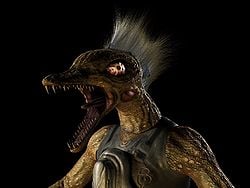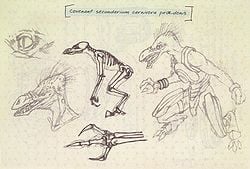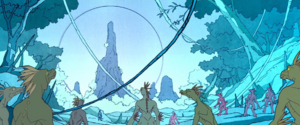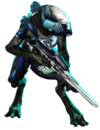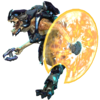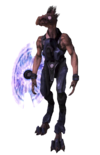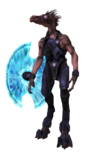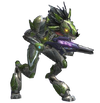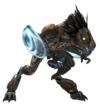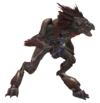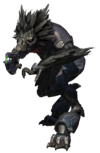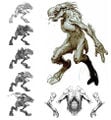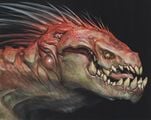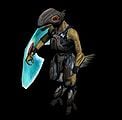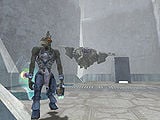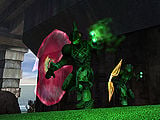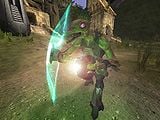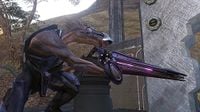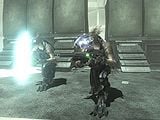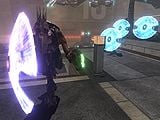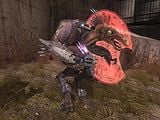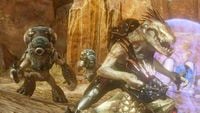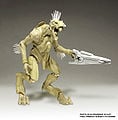Kig-Yar: Difference between revisions
From Halopedia, the Halo wiki
No edit summary |
mNo edit summary |
||
| Line 1: | Line 1: | ||
{{Era|Forerunner|Covenant|Human|UNSC|HCW|Post}} | {{Era|Forerunner|Covenant|Human|UNSC|HCW|Post}} | ||
{{references}} | {{references}} | ||
{{Species Infobox | {{Species Infobox | ||
Revision as of 04:58, March 8, 2014
| This article does not have enough inline citations and/or does not adhere to the proper citation format. You can help Halopedia by adding citations. |
- "Jackals may be superior marksmen and they're very sneaky, but that doesn't make them excellent snipers — they’re a little too bloodthirsty for that."
- — Anonymous UNSCDF serviceman
The Kig-Yar (sometimes rendered as "Kig-yar"; Forerunner designation: Perosus latrunculus, Latin for "hateful bandit";[1] human designation: Covenant secundarium carnivora prœdonis, Latin for "Covenant secondary carnivorous combatant"[2]), are a bird-like saurian species[3] which serve the Covenant as mercenaries and privateers. There are several distinct races of Kig-Yar; the most common of these races are known to humans as Jackals, while the more heavily-built Skirmishers represent another prominent subtype. In combat, Kig-Yar typically serve as snipers and scouts within the Covenant due to their excellent senses of sight, smell, and hearing.
History
The Ark and reseeding
The Kig-Yar were one of many species indexed by the Librarian as part of the Conservation Measure and preserved on Installation 00 from the firing of the Halo Array. They were subsequently returned to their homeworld, where they began rebuilding their culture.
Pre-Covenant history
During their early history, Kig-Yar society was divided into clans that sailed across Eayn's seas as pirates, raiding the encampments and settlements of rival clans. Eventually, the clans united, and the Kig-Yar species worked together in developing space-travel technology. Shortly afterward, they established colonies on many small asteroids around Chu'ot. Some Kig-Yar continued their ancient ways of life and became pirates once more, preying upon merchant starships. These groups of pirates were the Kig-Yar's only effective response to the overwhelming Covenant military juggernaut that arrived in the Kig-Yar home system in 1342.
The Covenant
The war between the Covenant and Kig-Yar forces culminated in sieges of redoubts on the asteroids surrounding their world. Eventually, in order to survive, they accepted Letters of Marque: commissions from the Ministry of Tranquility to engage in the services of the Covenant, though often this was merely used as an excuse to continue their plundering lifestyle. The Kig-Yar would spend much of their time preying on the ships of the Covenant's enemies, such as humanity.
Kig-Yar are around the same level as the Unggoy in the Covenant hierarchy, although the Kig-Yar despise the Unggoy and believe themselves to be superior. This reached a boiling point in 2462, when some Kig-Yar in High Charity attempted to poison Infusions, recreational narcotics the Unggoy enjoyed, which would have left the Unggoy sterile, in retaliation for the Unggoy encroaching on their habitats and displacing Kig-Yar nests. Although a junior staffer in the Ministry of Concert found evidence of this, the High Council failed to properly investigate the incident, culminating in the Unggoy Rebellion.
A Kig-Yar missionary ship, the Minor Transgression, was the first Covenant vessel to make contact with Humanity. The ship raided a commercial freighter leaving the planet Harvest, and the events that followed would later lead to full-scale military action on the part of humanity and the Covenant.
Following the outbreak of the Human-Covenant War, a group of Kig-Yar under Reth made contact with the Rubble, a community of human survivors of the glassing of Madrigal. The Kig-Yar agreed to trade Covenant weaponry in exchange for slipspace drives. Although the humans believed the Kig-Yar were rebels defying Covenant authority, they were in fact secretly proceeding with the blessing of the High Prophet of Truth to use the weapons to map UNSC space and learn the location of Earth. However, the plan fell apart due to the High Prophet of Regret sending Sangheili warriors to investigate the weapons, believing the Kig-Yar to be heretics.
During the Great Schism, the Kig-Yar sided with the Jiralhanae troops loyal to the Hierarchs against the Sangheili separatists.
Post-Covenant
Following the collapse of the Covenant and the end of the Human-Covenant War, the majority of Kig-Yar returned to a lifestyle of piracy and trade.[4] The overall population and social makeup of the Kig-Yar remained stable following the end of the war, with their homeworld experiencing manageable growth. Many Kig-Yar had dealings with humans, as well as the former Covenant species, in independent locations such as Venezia; some took advantage of the Covenant's collapse and began to loot valuable materials and technology from former Covenant installations.[5] A small number of Kig-Yar served as mercenaries alongside conservative Sangheili states,[4] and others later joined Jul 'Mdama's reformed Covenant, a splinter group that upheld the Covenant's religious beliefs in the post-war era. A notable exception to the chiefly disparate mentality of the Kig-Yar was Shipmistress Chol Von, who wished to gather a formidable naval force to defend the Kig-Yar home system from outside threats. However, few Kig-Yar shared her ambitions and her efforts ended up bearing little fruit.[5]
Description
Anatomy and physiology
Kig-Yar share many features with Earth avians as well as reptiles. Their legs are sinewy and muscular, and are reverse-jointed in a similar fashion to those of birds. Being carnivores, their sharp beaks are lined with razor-sharp teeth, and their tri-digit hands and feet have sharp talons. Kig-Yar have been known to eat the flesh of fallen enemies, as well as that of live prisoners. They are gifted with extraordinarily acute senses of sight, hearing, and smell, making them adept as scouts and snipers in the Covenant military. Kig-Yar are also very agile, and can execute swift jumps and rolls in combat; these abilities are most pronounced in the more muscular "Skirmisher" subspecies, members of which can leap great distances and cover ground at extremely high speeds. Kig-Yar possess a strong salty, occasionally acrid stench.[3][6]
Young Kig-yar chicks are covered in a brown fledgling down which gradually molts and gives way to scales and plumage as they age.[7] Male Kig-Yar possess plumes of spiny quills (feathers in the case of Skirmishers) at the back of the head and on the elbows; the color of this plumage indicates the Kig-Yar's mood.[8] Quill color also varies between subspecies; Jackal quills typically have brown, red or light blue coloration, whereas Skirmishers generally have black or reddish feathers. Females lack these quills, instead having calloused plates at the forearms and the rear of the head. This thick skin helps protect the female during courtship: when mating, the male will often bite, chew, and tear at the back of the female's head, neck, and arms. Kig-Yar reproduce by laying eggs which the female incubates, similarly to birds. When mating, the male can choose to fertilize the egg, in which a male is produced, whereas, if the eggs are not fertilized, a female is produced. This may imply that Kig-Yar have the ability to reproduce without mating, like some terrestrial birds.
While Kig-Yar have hollow avian bones and are physically frail, they are capable of moving quickly to evade harm. Their blood is bright purple in color, similar to that of the Sangheili, possibly showing a similar chemical makeup. They lack high amounts of calcium in their skeletons, which makes them a poor source of biomass for the Flood. Thus, Kig-Yar that are infected by the Flood are typically turned directly into carrier forms rather than combat forms. However, they have been utilized as combat forms during at least one engagement, the Battle of Shield World 0459.[9]
Subtypes
The Kig-Yar species is represented by at least three morphologically distinct subtypes. These include the mainstream "Jackals", the notably reptilian Jackals of Ibie'sh, and the more physically robust (and more avian) "Skirmishers" of T'vao. The morphological variation among the Kig-Yar likely represents divergent evolution in response to varied environments on prehistoric Eayn.[10][note 1]
Jackals typically exhibit light brown, tan, or sallow skin tones, with green skin appearing less often;[11] flexible quills on the head and forearms among males, with calloused plates among females; and elongated heads with bulbous eyes and beak-like snouts. The most common head morphology involves a downward-sloping snout,[12] though specimens with straight snouts are also common.[13][14][note 2]
Jackals hailing from the continent of Ibie'sh have the same body structure as most of their kin, but their heads are far more muscular and reptilian in appearance.[15][16] These Jackals also differ from the more commonly seen variety in having reddish plumes and yellow-tinted eyes. Whether this is a natural or artificial variation is unknown. Ibie'sh Jackals they served in the Covenant military as early as 2526[17] and now constitute the majority of Kig-Yar in the reorganized Covenant.
Skirmishers originated from Eayn's continent of T'vao.[18] They have darker skin and stockier, squared heads with small yellow eyes. They also have more beak-like mouths and bony facial coverings. Skirmishers have true feathers on their heads and arms, unlike the Jackals' quills. Like Jackals, Skirmishers have sharp talons on their hands and feet. While both subspecies are quite agile, Skirmishers are capable of sprinting at great speeds and leaping long distances. Male Kig-Yar from T'vao had much heavier upper body plumage than other Kig-Yar. Females from T'vao had a ruff of feathers on their heads and necks instead of scales.[19]
Culture
Kig-Yar society is matriarchal, with males described as being “henpecked” by their females. Kig-Yar have been known to coexist relatively peacefully with humans, as evidenced by the relationship between the Rubble and Reth's forces on Metisette, the cooperation of Kig-Yar on New Llanelli with ONI operatives, and their cooperation with Insurrectionists on Venezia. When the Kig-Yar were finally ordered by the Prophets to attack and destroy the humans of the Rubble, many of them even regretted the order. This is likely due to the pragmatic, mercantile culture of their race: As long as it benefits them economically, Kig-Yar will co-operate with nearly any group, even declared enemies of the Covenant.
Role within the Covenant
The Kig-Yar are unique among Covenant races: rather than being faithful followers of the Prophets' religion, they serve the Covenant due to the monetary rewards the Prophets pay them. However, due to the long time they have been in the Covenant, a large number of them have accepted the Covenant religion.
Kig-Yar serve primarily as light infantry, police forces, overseers and marksmen. Kig-Yar privateers also commonly crew Covenant missionary ships, such as the Minor Transgression. Originally, they were intended to replace the Unggoy as the foot soldiers of the Covenant, but their temperament made this impractical. Instead, they were assigned roles that were better suited to their natural abilities, such as scouts and snipers.
Within Covenant society, Kig-Yar have little status and are subservient to all but the Unggoy. Because of this, Kig-Yar frequently harass Unggoy to assert what little authority they have. In some cases, Sangheili or Jiralhanae dispose of criminals or prisoners by feeding them to Kig-Yar convicts, who eat the victim alive.
Due to their unique position in the Covenant, the Kig-Yar often utilized starships of their own making instead of Covenant-made ones. In addition, they were forbidden to build their own slipspace drives, and had to rely on heavily regulated, unmodifiable drives engineered by the San 'Shyuum instead.[20]
The Kig-Yar were not represented on the High Council but were instead vetted by the Ministry of Concert. The Kig-Yar did not vocally complain about their position but had instead selected to siphon off resources to their brethren.
Government
The Kig-Yar government on Eayn is a post-industrial capitalist system, with a population of 978 million.[21] It is also described as an ochlocracy, a system of government best described as a government by mob, or the intimidation of constitutional authorities; whatever form of local government the Kig-Yar possess is ineffective and ignored. Template:SectStub
Naming
Kig-Yar names usually consist of a single syllable, with two consonants and one vowel, such as Yeg, Jak and Bok. However, Chur'R-Yar and Chur'R-Mut, who were both Shipmistresses, have multiple syllables in their names. It is speculated that the Kig-Yar naming system is at least partially based on sex, rank, or both. However, their naming system might not be the one of their own culture; it has been stated that Sangheili do not allow the Kig-Yar to have more than one name. Alternatively, it may be that the Kig-Yar language consists of single syllable words (their name for themselves, Kig-Yar, actually is two single syllable words combined).
The prefix "Chur'R-" is believed to indicate the title of Shipmistress, as both Chur'R-Yar and Chur'R-Mut were female Kig-Yar in command of a vessel.
Homeworld
- Main article: Eayn
Eayn is the homeworld of the Kig-Yar species and is the primary satellite of the planet Chu'ot. It is characterized by its single equatorial ocean, sparse volcanism, and almost total lack of glaciation. Only about one-third of all Kig-Yar who still reside in the Y'Deio system call Eayn their home; many have chosen to live among the minor planets within the asteroid belt since their initial contact with the Covenant; one of these colonies is Dal'koth.[22] The most notable Kig-Yar interplanetary colonies are known as Muloqt, Kaelarot, and Valyanop.[4]
Rank structure
"Jackal" ranks
|
"Skirmisher" ranks
| |||||||||||||||||||||||||||||||||||||||||
Other Ranks
Shipmaster
Some Jackals have gained the rank of Shipmaster, and are able to lead their own ships in the Covenant Navy. Because of their pirating reputation, the rank of Shipmaster is usually given only to Elites and Brutes.
Pirate Prince
Although not formally considered a rank, the Jackal Krith was known to be one before his death.
Trivia

|
See our gameplay information related to Kig-Yar on its gameplay page. |
- A "jackal" is a wild scavenging dog, (similar to the coyote), that lives primarily in northern Africa. The name is used in reference to the Kig-Yar's scavenging nature.
- "Kig-Yar" is an anglicized form of the Welsh term "cig iâr", which means "chicken meat".[23] It is also similar to the term "cyw iâr", which means simply "chicken".[24]
- Although Jackals carry grenades in Halo 2 , they are never seen using them. This is possibly because of the fact that, in terms of game mechanics, they 'dual-wield' their energy shield with whatever weapon they are carrying.
- In all games prior to Halo: Reach, all Jackals shoot left-handed and are the only Covenant species to do so. However, in Halo: Reach and Halo 4 Jackals shoot with their right hands and carry their shields with their left hands; this generally makes it harder to shoot through the gap in a Jackal's energy shield, as all player characters are right-handed.
- Occasionally, Jackals can be seen without their usual bright spines on their heads.[citation needed] Canonically, these would likely be females, though this appearance is probably the result of a glitch.
- "Wild Jackals" appear in early concept art for Halo Wars. Their dress resembles that of the eponymous aliens from the Predator franchise.
- The Jackal language was created by reverse-playing speech recordings of Martin O'Donnell, the composer of Bungie's Halo games.[citation needed]
- The redesigned Jackals that appear in Halo 4 bear a rather overt resemblance to Zilla, the eponymous monster of the 1998 American Godzilla film.
Gallery
- Cov jackalfinal.jpg
Concept art of the Kig-Yar for Halo Wars.
- Jackal warrior.jpg
Concept art of a "Wild Jackal" for Halo Wars.
- 1771880-gallery.png
Concept art from Halo Legends: Homecoming.
- 1775174-gallery.png
Renders from The Package.
Jackal in the level Assault on the Control Room in Halo: Combat Evolved.
- Jackal Lakeside.jpg
A Kig-Yar sniper from Halo 2 wields a particle beam rifle.
- 1215645880 Jackal Blood.jpg
A Jackal's blood stain.
- 19317669-Full.jpg
A Kig-Yar Minor on patrol on The Ark in Halo 3.
- Covenant jackal.gif
Kig-Yar, as they appear in Halo Wars.
A Kig-Yar Major in Halo: Reach.
List of appearances
Note
- ^ A reference video on Halo Waypoint suggests that these differences might traced to the Kig-Yar adapting to different colony worlds over millennia, largely due to differences in gravity. The establishment of T'vao and Ibie'sh as the respective homes of the Skirmishers and Halo 4's Jackals seems to contradict this.
- ^ In Halo: Combat Evolved, Jackals have squat heads, very bulbous eyes, baleen-like teeth, and dark green or reddish orange skin. This design has not been featured in any subsequent media and has seemingly been retconned from existence by Halo: Combat Evolved Anniversary. Anniversary instead uses the Halo: Reach design, though it is scaled down to the original Jackals' smaller frame, giving the Jackals squat heads and much shorter necks.
Sources
- ^ halo.bungie.org: Bestiarum Latin names translated
- ^ Dr. Halsey's personal journal
- ^ a b Bungie.net: ODST Guide
- ^ a b c Eleventh Hour reports - Report 2
- ^ a b Halo: Mortal Dictata
- ^ Halo: Glasslands, page 159
- ^ Halo: Mortal Dictata, page 71
- ^ Halo: Contact Harvest, pages 56/58
- ^ Halo Wars
- ^ Halo Encyclopedia (2011), pages 56 and 57
- ^ Halo Legends - Origins and Homecoming
- ^ Halo 3, Halo: Reach, and related media
- ^ Halo 2
- ^ Halo: Uprising
- ^ Halo 4
- ^ Halo 4: The Essential Visual Guide
- ^ Halo 4: Forward Unto Dawn
- ^ Halo: Mortal Dictata - Chapter 2
- ^ Halo: Mortal Dictata, Chapter 3
- ^ Halo: The Cole Protocol, page 222
- ^ Bestiarum
- ^ Halo: Mortal Dictata, page 73
- ^ Google Translate - cig iâr
- ^ Google Translate - cig iâr
